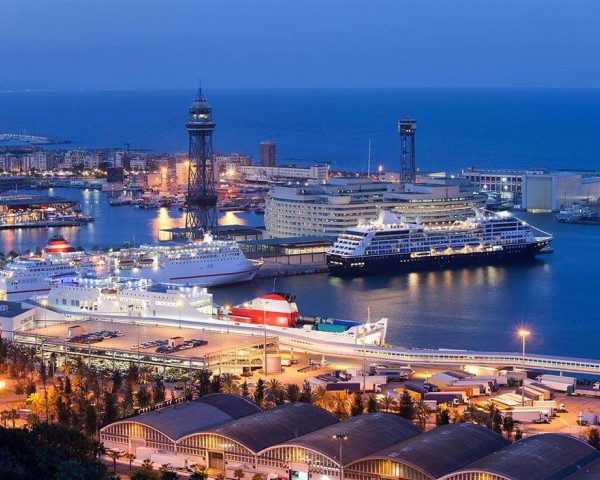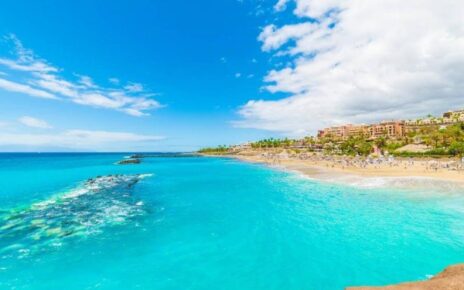The tax being prepared by the authorities in Barcelona to tax polluting emissions from cruise ships, container ships and other large vessels “would not have a deterrent effect” on tourism. So says Eduard Torres, president of Turisme de Barcelona, the consortium in charge of promoting tourism in the city.
Foment del Treball and the Barcelona Chamber of Commerce warn that the measure could penalize the port of the Catalan capital, while the organization Transport and Environment, generally assess the measure positively.
Eduard Torres maintains that the introduction of the new eco-tax on cruise ships is part of a social trend that “places sustainability at the center of activities: a trend that will intensify”, while policies in favor of cleaner mobility are growing, with proposals that “encircle all polluting activities”. Torres highlights that Barcelona registered in 2019 a total of 3 million cruise passengers. In 2022, there have been 25% fewer visits, “but the economic figures have been similar, despite the fact that there have been fewer visitors.” “We need tourists who come not only to stroll along the Ramblas,” he stresses. A pact reached in 2018 in Barcelona limits the space for cruise ships.
Shipping Companies against the Initiative
Elena Seco, general director of the Spanish Shipping Association (ANAVE), rejects this legislative initiative. She argues that maritime transport has a global character; and for this reason, the United Nations has entrusted a specific agency, the International Maritime Organization (IMO), with the task of drawing up and reaching a consensus on international conventions to achieve the most uniform maritime legislation possible among all countries, “in order to avoid each country or each port having its own different rules”.
For this reason, she suggests that the rules be established in the context of this organization, which has established some regional regulations on maximum emissions for certain pollutants, but as a technical requirement, without having a taxing character… “If each port in each country had its own tax regulation, this business would be very complicated to manage,” said Seco.
Warning of Side Effects
Salvador Guillermo, director of Economy of Foment del Treball, warns that this new eco-tax on cruise ships may have “distorting territorial side effects”, so he suggests that instead of “punishing a specific activity”, preventive actions of pollution should be encouraged. “We are not in favor of new taxes. Catalonia is already a pioneer for the high number of taxes in various areas.” Fomento does not want more taxation, which affects the competitive capacity, because most of these taxes do not exist in the other autonomous communities. “The situation in 2023 – low growth of the Catalan and Spanish economy – is difficult enough to increase costs even more…”, he adds.
Sources from the Income
The authorities will implement this new tax in Barcelona to tax pollution by nitrogen oxides and particulate matter from large ships, and they expect to collect between 9.7 million euros -in 2023 – and 34 million by 2026.
However, this estimate may vary according to two factors: one, the final figure will depend on how ship emissions evolve (“if there is a tax, shipping companies may send less polluting ships here,” say sources from the authorities); and two, the rates of the tax, which is subject to an evaluation to be carried out three years after its implementation.
The income will serve to nourish the resources of the fund for the protection and improvement of air quality, created in the 1983 law.
This is one of the taxes agreed upon between the Govern and the Commons in the framework of the agreement to move forward the budgets for 2023. However, it does not have the support of the socialists.
Transport and Environment call for the inclusion of sulfur oxides
The environmental organization Transport and Environment (T&E), valued “positively” that the Generalitat has recognized the need to regulate the polluting emissions of maritime transport since this is one of the most backward sectors in the ecological transition.
However, this organization points out that one effect of this regulation is that it will make liquefied natural gas, one of the fossil fuels with the greatest climate impact, more competitive, so another specific regulation would be needed to penalize LNG and promote hydrogen, as explained Carlos Bravo, member of T&E.
Bravo highlights that the levy will only apply to emissions in ports, so its impact would not be significant on the overall activity of maritime transport, but on ships that spend more time in port (cruise ships or bulk carriers).
T&E understands that the future law does not regulate emissions of sulfur oxides (SOx) due to the next area of protected atmosphere in the Mediterranean (Med SECA of the IMO, which will enter into force in 2025), which will force ships to reduce these emissions, but believes that this is not an obstacle also to include a tax for SOx emitted by ships in port. However, the amounts of money raised are smaller.
This organization demands that the Generalitat promote to the World Maritime Organization the declaration of a protected atmosphere zone for the Mediterranean to reduce admissible nitrogen oxide emissions. And it suggests that the revenues obtained could also be used to promote clean fuels (hydrogen…).




